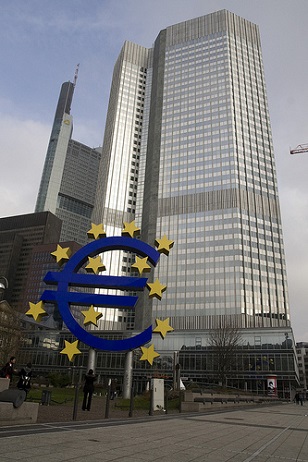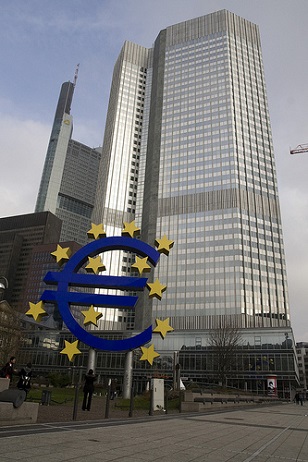 Jurjen van Enter / Flickr )” width=”308″ height=”462″ />The European Central Bank. (Photo: Jurjen van Enter / Flickr)It’s not news that the Wall Street banks have enormous influence over policy in Washington. After all, most of the big banks would have gone bankrupt in the financial crisis if not for the massive bailout engineered by the Treasury and the Federal Reserve Board.
Jurjen van Enter / Flickr )” width=”308″ height=”462″ />The European Central Bank. (Photo: Jurjen van Enter / Flickr)It’s not news that the Wall Street banks have enormous influence over policy in Washington. After all, most of the big banks would have gone bankrupt in the financial crisis if not for the massive bailout engineered by the Treasury and the Federal Reserve Board.
But the handouts from the government did not end with the crisis. The government continues to provide a massive subsidy to the banks in the form of its implicit “too big to fail” insurance. This means that creditors assume that if the big banks get in trouble again, the government would step in and bail them out, just like in 2008.
Since creditors believe the government stands behind these big banks, they are willing to lend them money at lower interest rates. Bloomberg news estimated the size of this subsidy at $83 billion a year. By comparison, the food stamp program is projected to cost $76 billion this year.
In other words, a few big banks will get a larger subsidy from the government than the tens of millions of people receiving food stamps. In the world of makers and takers, the big banks are industrial-strength takers.
But there are even more benefits to being one of the big banks. Apparently, the Treasury Department is expected to lobby on their behalf in other countries. This is what we are seeing now as 11 countries in the European Union attempt to jointly implement a financial speculation tax. This is part of a popular European effort to raise revenue by cracking down on speculative trading by their major banks.
The tax enjoys overwhelming support from the public in countries like Germany, Italy, and elsewhere in Europe. This is what has pushed their political leadership to support the tax. However, the U.S. Treasury Department seems determined to obstruct the path.
The immediate issue is that U.S. banks want to be exempted from having to pay the tax, and the Treasury Department is pushing their case. First, it is important to understand that no one is trying to single out U.S. banks for punishment under the proposed European tax. The argument by the Europeans is that U.S. banks should be subject to the trading tax in the same way that U.S. citizens are subject to taxes on restaurants and hotels when they eat at a restaurant or stay at a hotel in Europe.
This is important not just because the Europeans are worried about losing a slice of the revenue if the U.S. banks are exempted; they are worried that the tax would be completely undermined. If active speculators in stock or derivatives know that they can evade Europe’s tax simply by doing their trades through a subsidiary of a U.S. bank, then all the active traders will conduct their trades through U.S. subsidiaries. The result would be that the frequent traders who were the primary target of the tax would be largely able to escape the tax.
By pushing this line, the Treasury Department is effectively defending the right of U.S. banks to run tax-avoidance schemes against European governments. If Treasury succeeds, it would make the tax pointless.
And that is undoubtedly the objective. If the Treasury Department believed that the tax was simply a case of bad policy, it could send a quick note of advice to their European counterparts and then get on with other business. After all, Europeans make bad decisions all the time without causing government officials in Washington to break a sweat.
However, the European financial speculation tax raises concerns among the US’s powerful for a reason quite opposite from fears of bad policy; the folks in Washington are worried that it will succeed. They are worried that the tax will raise large amounts of revenue at the expense of the big financial speculators. This is a classic win-win. The government will have more revenue by reducing speculation that is harmful to financial markets and the larger economy. And since the financial sector produces many of the highest incomes in the economy, a downsized financial sector should also imply less inequality.
So the European speculation tax will lead to a more efficient and stable financial sector, more revenue for governments and less inequality. And the only losers are the big rollers in the financial industry.
Naturally Wall Street would do everything in its power to stop the spread of such taxes; after all, some may want to impose speculation taxes in the United States. For that reason, it is no surprise that Wall Street would try to block the European tax, but does President Obama really have to assist this effort? Can’t the millionaires and billionaires on Wall Street for at least once stand on their own two feet? Treasury Secretary Jack Lew should tell Goldman Sachs and Jamie Dimon that they have to hire their own lobbyist if they want to protect their ability to do tax scams in Europe.
We’re not backing down in the face of Trump’s threats.
As Donald Trump is inaugurated a second time, independent media organizations are faced with urgent mandates: Tell the truth more loudly than ever before. Do that work even as our standard modes of distribution (such as social media platforms) are being manipulated and curtailed by forces of fascist repression and ruthless capitalism. Do that work even as journalism and journalists face targeted attacks, including from the government itself. And do that work in community, never forgetting that we’re not shouting into a faceless void – we’re reaching out to real people amid a life-threatening political climate.
Our task is formidable, and it requires us to ground ourselves in our principles, remind ourselves of our utility, dig in and commit.
As a dizzying number of corporate news organizations – either through need or greed – rush to implement new ways to further monetize their content, and others acquiesce to Trump’s wishes, now is a time for movement media-makers to double down on community-first models.
At Truthout, we are reaffirming our commitments on this front: We won’t run ads or have a paywall because we believe that everyone should have access to information, and that access should exist without barriers and free of distractions from craven corporate interests. We recognize the implications for democracy when information-seekers click a link only to find the article trapped behind a paywall or buried on a page with dozens of invasive ads. The laws of capitalism dictate an unending increase in monetization, and much of the media simply follows those laws. Truthout and many of our peers are dedicating ourselves to following other paths – a commitment which feels vital in a moment when corporations are evermore overtly embedded in government.
Over 80 percent of Truthout‘s funding comes from small individual donations from our community of readers, and the remaining 20 percent comes from a handful of social justice-oriented foundations. Over a third of our total budget is supported by recurring monthly donors, many of whom give because they want to help us keep Truthout barrier-free for everyone.
You can help by giving today. Whether you can make a small monthly donation or a larger gift, Truthout only works with your support.
